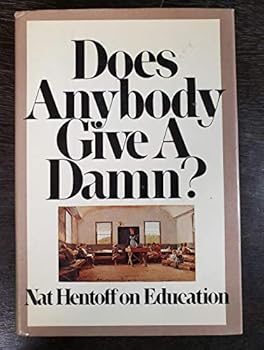Does Anybody Give a Damn?: On Education
SHIPS FROM CALIFORNIA!!HASSLE FREE RETURNS!! This description may be from another edition of this product.
Format:Paperback
Language:English
ISBN:0394409337
ISBN13:9780394409337
Release Date:January 1977
Publisher:Random House (NY)
Length:245 Pages
Weight:1.05 lbs.
Customer Reviews
1 rating
Humane Education Without Abandoning Basic Skills
Published by Thriftbooks.com User , 20 years ago
Nat Hentoff does give a damn, as do the principals and teachers he writes of warmly in this series of vignettes of their gargantuan struggles to improve the New York City school system. From the perspective of a quasi-investigative reporter, Hentoff looks searchingly at schools that work because educators are determined to see them work. Early in the book he says, "My main interest all along in writing about education has been in finding ways in which certain schools can and do work for all kids, or for a larger percentage of them than is or has been the norm." The author of the award-winning Our Children Are Dying (1966), Hentoff has continued writing on education, his trenchant social criticism appearing regularly in such periodicals as The Nation, The New Yorker, and Social Policy. He does not offer a panacea for education's chronic ailments but, rather, provides a multifaceted view of diverse teachers, schools, and programs whose only common denominator is hard work, commitment, and caring. Specifically, he espouses three crucial beliefs that, emphasized repeatedly, serve as the kingpin around which effective education presumably revolves. First, children are educable. Second, parents are participants in the education of their children. Third, administrators and teachers are accountable for their failures. In a crisp, journalistic style sometimes approaching eloquence, Hentoff argues in favor of a humane education that does not abandon or even de-emphasize the basic goals of high-quality education. The educators he portrays relate their success stories, mostly with ghetto and minority children characteristically destined for society's junk heap. These successes result in large measure from the high expectations of principals, teachers, and parents all insisting cooperatively on essential reading and math skills within an environment in which children feel secure, cared for, and respected. One of those who cares, who gives a damn, is Martin Schor, a no-nonsense Brooklyn elementary school principal. Fairly traditional in educational philosophy, Schor set high standards for school's mostly black and Hispanic and residents, many of whom were considered by professional observers to be "uneducable." Soon, however, more half of these so-called "disadvantaged" students were reading above the national norm. Another who cares passionately is Luther Seabrook, a flamboyant administrator fond of the term "Third-World kids" to describe the mostly nonwhite teen-agers in the Manhattan high school he runs. He persisted in demanding that all pupils learn to read before graduation. Among other initiatives, he arranged for the transfer of teachers not producing solid academic results. Eventually he radically upgraded the school's previously poor level of achievement in core subjects. Still others who care - who refuse to give up on kids or become discouraged by budget cuts and the bureaucratic morass seemingly endemic in New York City - are John Simon,





